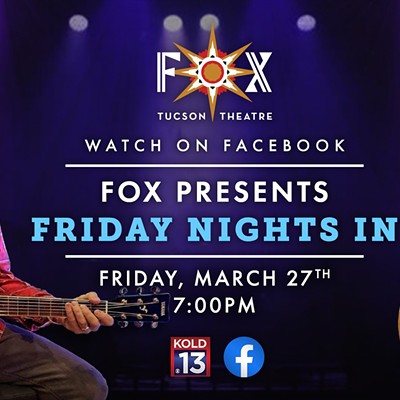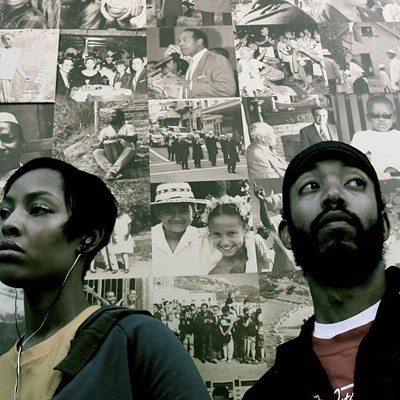But this is not an article about the Generator, or procrastination, or cheap rhetorical gimmicks to begin a story. Nay, this is a treatise on the Prog Hardcore Wave stylings of the aforementioned Blood Brothers, a Seattle five-piece ready to rock the Congress next Thursday.
Formed in Seattle in 1997, The Blood Brothers exemplified the "metastasizing side project" conundrum (e.g. The Postal Service), relates singer/keyboard throttler Johnny Whitney. "We were all in bands besides the Blood Brothers, so it was something we didn't take all that seriously, something that was intended to be fun. About the first three years, that's what it was, just this band we would play in to just kinda not take ourselves too seriously, and just have a good time, and the sound went along with that. Our first couple records, we really didn't spend a lot of time writing them or recording them; they just kind of happened."
Notwithstanding this early nonchalance, The Blood Brothers' spastic brand of hyperkinetic hardcore attracted attention from industry quarters. "About three years, ago we got signed to ARTISTdirect, and we did a record with Ross (Robinson) which was Burn Piano Island, Burn," says Whitney.
Robinson, the Phil Spector of nü metal, is perhaps best known as the go-to producer for antagonists of proper spelling like Korn and Limp Bizkit. In other words, Robinson was perhaps not the best match for The Blood Brothers, who--despite their aggressive, abrasive sound--are more at home at a potluck dinner than a titty bar.
For Crimes, The Blood Brothers' V2 debut, the band "consciously decided not to work with (Robinson), for a number of reasons," according to Whitney. "The more publicity (Burn Piano Island, Burn) got, the more it became apparent that if we did another record with Ross, we would be considered like a Ross Robinson band, which wasn't something that we were terribly interested in. I don't regret in any way doing a record with him, but at the same time, when it came to deciding who was going to do Crimes, we definitely wanted to work with somebody who was more like-minded (to us) musically."
Enter John Goodmanson, the Phil Spector of Pacific Northwest indie pop, whose production emphasizes nuance as opposed to the bludgeoning work of Robinson. "With John, there are a million records of his stuff, that we were into the way they sounded and into the way they turned out. It was the first time we ever actually had a choice of who to (have produce) our record," explains Whitney.
"Ross, he comes from a completely different school of musical thought, and you know, none of us were really ever fans of the music he put out. I don't think we'll ever do a record again with him. And like I said, I don't regret it in any way. I just think he's a really awesome guy, but we're just not on the same path."
Goodmanson's deft touch, coupled with the band's desire to write songs that weren't so physically demanding to play as the Burn Piano Island, Burn tracks, resulted in a more relaxed recording, although Crimes is far from soft.
"Every time I've listened to Burn Piano Island, Burn since it's been recorded," says Whitney, "it's struck me as very metal-sounding, and very precise, and very clean, and all the drums are edited to sound, when you listen to it, almost like a drum machine; it's edited so tight. It just lacks a lot of space, a lot of looseness that we succeeded in capturing on Crimes." And so it would seem that Crimes is more of a reflection of the band in its natural state, closer to a seminal group like Brainiac and the rubric of absurdist new wave (Whitney readily acknowledges the influence) than to something like Coheed and Cambria and their mimicry of Rush.
Back in November, the Blood Brothers snubbed Ye Olde Pueblo at the last minute, promising to come back in the spring. "We had to cut the last two dates off our previous tour to do (some) shows in Europe. We got offered this show with the Yeah Yeah Yeahs in London, and so we had to cut the tour short in order to get over there," says Whitney. "It was really fun. They're super, super big over there." Never let it be said they don't make good on their promises to return to Tucson, although it should be noted that it's not quite spring yet.
What do Whitney and his bandmates ultimately want to accomplish with Blood Brothers?
Whitney pauses. "That's a hard question. I think about this a lot, and it's sometimes hard to, like, justify being a musician. At the end of the day, what are you doing for people and what is your contribution to the greater social order? I don't think there's any kind of emotion you can get from anything like the emotion you get out of music. I think that just being able to do that for people is the most important thing."










